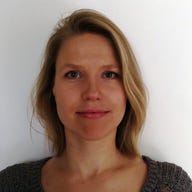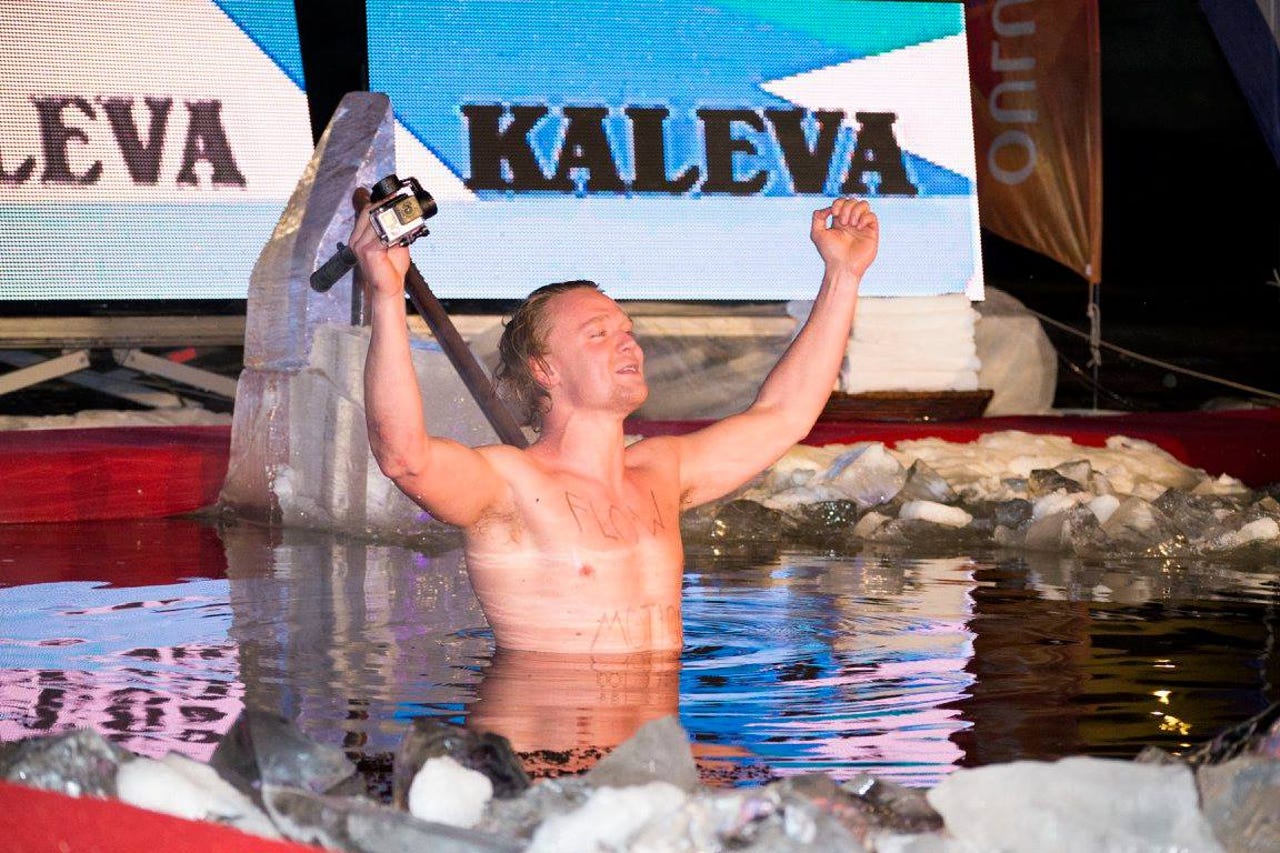Cut ice hole, stand a startup exec in it: Finland's super-cool approach to pitching for funds


FlowMotion marketing director Didrik Dege Dimmen back-flipped into the ice hole for his presentation.
The city of Oulu is situated in northern Finland, just 220km from the Arctic Circle. It's a dark, drizzly place where the temperature hovers around freezing. Although the idea of staying warm indoors is appealing, few seem interested in doing that during Oulu's annual Polar Bear Pitching event.
Now in its third year, Polar Bear Pitching is an early-stage startup competition where presentations have no time limits. Entrepreneurs can take as long as they like to pitch to an investor jury, but they only have this freedom while standing in freezing water in a hole drilled into sea ice.
"We have always thought we [in Oulu] are slightly crazy and want to do things differently," explains Christian Sundell, chairman of the event organising group. "If we are this small city, far in the north, we have to find ways to stand out."
Pitching from an ice hole definitely does that. It may sound like a crazy concept, but for the 20 pre-selected finalists, it is an opportunity to practise their pitching skills and secure pre-seed or seed funding. The winner gets a €10,000 cash prize, professional services from the event partners, and a two-week stay in Silicon Valley.
See also
This year the first prize went to Norway's FlowMotion Technologie, whose marketing director Didrik Dege Dimmen captured audience attention by back-flipping into the ice hole, after losing a round of rock, paper, and scissors with colleagues in the office.
"To be honest, I don't remember how the ice hole felt. I had a clear strategy to create a rush of adrenaline to block out the pain," Dimmen says.
FlowMotion will put the prize money towards bringing its motorized stabiliser for GoPro cameras to market. While not first on the gimbal market, the year-old startup argues that its regulation-system design ensures shake- and vibration-free video, no matter how a camera moves.
"We have working prototypes and we're now working very iteratively with our customers and users [to finalize the product]," Dimmen says. "This is fine technology, a really small engine, a micro controller, and it's very sensitive, so to make it bug-free is a long process and we are closing in on that."
What defines Polar Bear Pitching is its focus on early-stage ventures. While technology startups held a clear majority at the event, the finalists represent everything from system-test automation and gaming to microhousing and butterfly feeders. Most of the finalists are either working on prototype hardware and services or just starting to gain customers.
Finnish startup Equivalentor is one of the companies with a product already gaining traction. The startup's cloud-based feedback tool for recruiters and job applicants is currently used by about 20 companies, mostly in Finland, with a few pilot customers abroad.
How it works is a recruiter uses the tool to rate selected attributes from the would-be candidate's application. The tool then automatically generates a personalized feedback email for the applicant.
The email contents are generated by an artificial neural network that mathematically mimics how language works to create personalized messages using large variance text generation, which Equivalentor is currently seeking to patent.
"When writing feedback [to job applicants] by hand, you can do three inside an hour. With our system it takes 10 seconds," CEO and co-founder Saku Valkama says.
At Polar Bear Pitching, where the startup placed third, Equivalentor was looking for investors to expand the service with new language versions and integrations with HR systems.
The attention Polar Bear Pitching draws is a welcome change for Oulu. In 2014 Oulu suffered a major blow when Microsoft announced the closure of Nokia's former R&D center in the city, with the loss of about 500 jobs. But the city, and its 200,000 inhabitants, are recovering.
"The global downfall of Nokia's mobile phones directly affected around 3,000 people in Oulu. At its height, 2,500 people worked for Nokia and 500 to 600 more in subcontracting. But only a few hundred of them are still unemployed," says Janne Mustonen, ICT account director at BusinessOulu, the city's publicly run business development services provider.
Mustonen says hundreds have found employment in startups. Janne Kyllönen, one of the entrepreneurs at Polar Bear Pitching, although not in the ice hole, has had a long Nokia and Microsoft career and agrees the layoffs have benefited the local startup community:
"There are people available [in Oulu] with world-class technical expertise and who believe we can make devices fit for international competition," Kyllönen says. "We don't have a single person in our team that doesn't have some kind of tie to Nokia."
Kyllönen started his company in early 2015, following the layoffs at Microsoft. QuietOn develops wireless noise-cancelling earplugs, which use a combination of active noise-cancellation technology and acoustic attenuation to block out environmental noise.
When the earplugs' microphone detects sound waves in the ear canal, a counter wave is electronically created and played through the earplug speakers, causing the waves to cancel each other out.
While this approach is not new, where QuietOn says it is doing things differently is the miniaturization of this technology while still offering the same level of noise reduction as premium on-ear noise-cancelling headphones.
"What is completely new here is the size. Wireless, small, active-noise cancellation devices haven't existed before," Kyllönen says. "In many [current headsets] the active noise cancellation is quite weak; it is only meant to supplement the music listening experience."
By contrast QuietOn wants to create silence to help people sleep, travel, or work better in noisy environments. The startup has so far raised $280,000 in crowdfunding on Indiegogo, starting with a $50,000 target, and will soon begin manufacturing, but Kyllönen participated in the Polar Bear Pitching event in hopes to find new sales channels.
While one could claim Polar Bear Pitching is just a wacky marketing gimmick, it is hard to deny the attention raised by adding some freezing water to the traditional startup pitching process.
"I've been hearing about this ever since I moved to Stockholm [two years ago]," says Tanya Marvin-Horowitz, managing partner at US and Sweden-based investor Capital A Partners. "I haven't been this far north in Finland before. It was the perfect excuse to see what's going on here."
The arctic event also attracted the US and Canadian ambassadors to Finland to open the pitching competition officially. Both even braved the elements with a long dip in the icy water. For the organisers, this is a sign of a success.
"The competition will definitely be organized again next year," Polar Bear Pitching's Sundell says. "We have already done quite a lot of planning. We also have some potential places for pre-competitions in interesting places around the world."